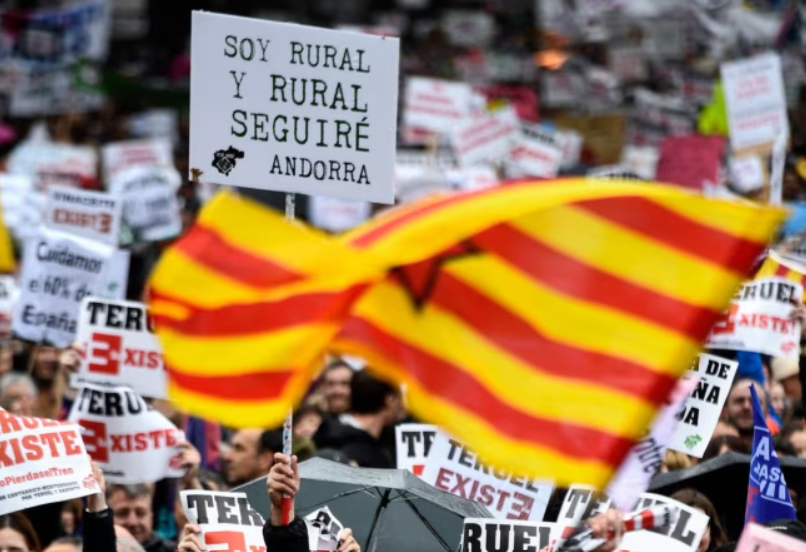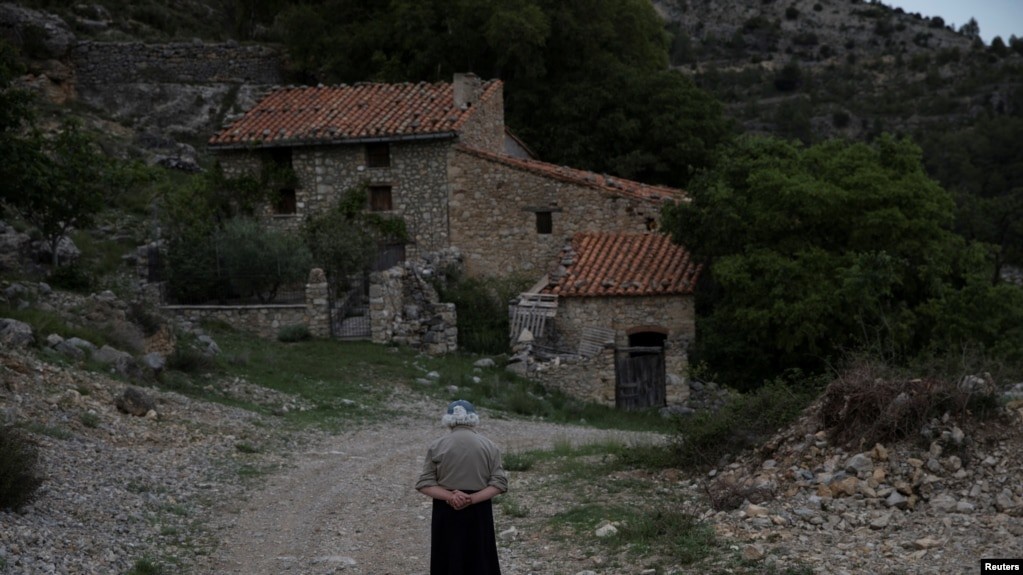By Carmen Chang,
On February 11, 2021, the Colegio de España hosted an online conference-debate titled “The Literatures of Deserted Spain”, featuring Spanish novelist Use Lahoz in conversation with linguist Laura Gil-Merino. The event centered on Lahoz’s most recent novel, Jauja, a work that offers a profound exploration of rural depopulation in Spain and the emotional landscapes it leaves behind.
The discussion began not with the book itself, but with an historical context—mid-20th century migration in Spain. In the 1950s, economic hardship and limited opportunities drove thousands to abandon small villages for urban centers or foreign cities such as Paris. This rural exodus reshaped the nation’s economy, popular culture, and even architecture, inspiring new models for social housing. The iconic white residential towers of Madrid and Paris, for instance, became symbols of both aspiration and displacement, influencing generations. Similar patterns, with equally transformative consequences, could be observed in provinces like Teruel, where entire villages were left nearly empty.
It is within this backdrop of demographic and cultural change that Jauja unfolds. Structured in twenty-two chapters and framed by a symbolic 48-hour theatrical performance, the novel chronicles the relationship between a father, Teodoro Broto, and his daughter, María Broto. After Teodoro’s death, the narrative moves fluidly between past and present, tracing the deep emotional rifts and missed chances for reconciliation that define their bond.
One of Lahoz’s most striking narrative devices is the interplay between nostalgia and regret. María left her village as a young girl, breaking contact with her father. Their estrangement was marked by unspoken grievances and the absence of apologies, creating a gulf too wide to bridge. By the time both characters confront the possibility of reconciliation, the moment has passed —leaving María with a lingering moral dilemma and an unhealed wound. Lahoz’s portrayal of this fractured relationship resonates with a universal truth: The most painful losses often stem not from events themselves, but from the words left unsaid.

Themes of forgiveness and pride recur throughout Jauja. In one subplot, María’s long-standing friendship with Ruth collapses over a petty argument, revealing how ego can sever even the closest ties. Here, Lahoz’s prose reminds readers that the meaning we attach to words —and the silences we maintain— can alter the course of human relationships.
The novel also operates as a kind of travel literature, carrying readers through both physical landscapes and emotional geographies. Some characters embody the voices of those who left rural Spain only a few years ago, reinforcing the continuity of migration as a theme. These intertwining stories form what can be described as an epic meditation on the tension between personal aspirations and the external forces —social, economic, and historical— that shape human destiny.
María Broto herself is introduced as a celebrated stage actress in the early 1940s. The novel’s inciting moment comes as she leaves the premiere of her dream role, playing Liubov Andreyevna in Chekhov’s The Cherry Orchard. Waiting at the theater’s stage door is a man she does not immediately recognize. He identifies himself and delivers unexpected news: her father has died suddenly. He invites her to return to their childhood village to attend the funeral the next day.
What follows is María’s internal struggle. The journey back would mean revisiting a childhood marked by emotional wounds that never fully healed. Lahoz draws the reader into hesitation, crafting a narrative that oscillates between time periods, locations, and moods. Past and present collide, revealing how memories —both tender and painful— continue to shape identity.
Through its ensemble of characters, Jauja tackles universal themes: love and loss, the fragility of success, the sacrifices imposed by time, the difficult possibility of forgiveness, and the longing for redemption. The book also examines the courage required to face the truth, and the enduring imprint of childhood experiences —the “cherry orchard” of memory that may appear radiant from the outside while concealing inner turmoil.
For many attendees, including this reporter, the conference was more than a literary discussion —it was an emotional experience. Prior to the event, I had only a passing familiarity with Lahoz’s work and approached Jauja with some skepticism. Yet, as the author and Gil-Merino unpacked the novel’s layers, I found myself deeply moved. The book’s core —an exploration of forgiveness, reconciliation, and the enduring love between parent and child— struck a chord.
The conversation underscored a point that transcends literature: family relationships are fragile, shaped as much by moments of silence as by spoken words. Lahoz’s narrative invites readers to confront uncomfortable truths about pride, regret, and the time we often waste before attempting to mend what is broken.
While Jauja may not directly align with my current research interests, the themes it addresses enrich my broader intellectual and cultural perspective. As a scholar working within Hispanic studies, I believe it is crucial to engage with literature that expands our understanding of the human condition, even when it falls outside our primary field of study. The multidisciplinary nature of our work —intersecting civilization, literature, and translation— benefits from such encounters.
The event also exemplified how effective a literary presentation can be when it combines historical framing with a close reading of a text. Lahoz and Gil-Merino’s approach was both didactic and accessible, drawing connections between Spain’s demographic history and the novel’s fictional world. By grounding Jauja in the context of mid-20th century migration, they illuminated how fiction can serve as both a mirror and a commentary on social realities. Ultimately, “The Literatures of Deserted Spain” was not just a discussion about a book —it was a meditation on memory, identity, and the ties that bind us to the places we come from. Whether through the image of an abandoned village, the tension of an unspoken apology, or the bittersweet pull of a return journey, Lahoz’s work reminds us that our personal histories are inseparable from the landscapes in which they unfold.

The conference left me with the desire to read Jauja in its entirety, not simply for its plot, but for the questions it poses: Can we ever truly reconcile with our past? Is forgiveness always possible, or does time inevitably close certain doors? And how do the spaces we inhabit —or abandon— continue to inhabit us?
In the end, Lahoz’s narrative suggests that while the past may not be redeemable in every case, the act of confronting it can itself be transformative. Like the cherry orchard in Chekhov’s play, the landscapes of Jauja are at once beautiful and melancholic —symbols of both loss and the stubborn endurance of memory.
For those interested in contemporary Spanish literature, rural depopulation, or the intersections of history and fiction, Jauja offers a poignant, multi-layered reading experience. And for those who have ever left a place —or a person— without saying goodbye, its pages hold a mirror that may be difficult, but necessary, to face.
Reference
- Colegio de España. The Literatures of Deserted Spain. Online conference with Use Lahoz and Laura Gil-Merino, 11 February 2021.




